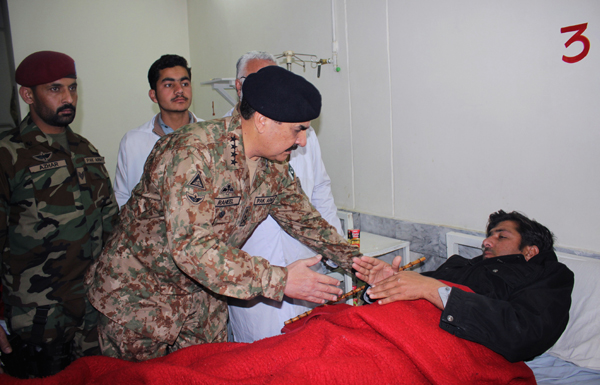Charsadda, Pakistan — At least 21 people died when gunmen armed with grenades and Kalashnikovs attacked a university in Pakistan Wednesday, with all four attackers killed by security forces who moved in under thick fog to halt the bloodshed.
The assault was claimed by a Pakistani Taliban faction but branded "un-Islamic" by the umbrella group's leadership, who vowed to hunt down those responsible.
Police, soldiers and special forces swarmed the Bacha Khan university in the northwestern town of Charsadda from the ground and the air to try to shut down the assault.
Television images showed female students running for their lives and witnesses reported at least two explosions.
Pir Shahab, superintendent of investigations in Charsadda, said the 21 dead included one professor, two gardeners, one caretaker, and 17 students.
Four attackers killed by security forces were not included in the toll, he said.
Regional police chief Saeed Wazir, who also put the toll at 21, told AFP that most of the student victims were shot dead at a hostel for male students.
An AFP reporter saw pools of blood and overturned furniture at the hostel, where security forces cornered the four gunmen.
"More than 30 others including students, staff and security guards were wounded," Wazir added.
He said the attackers had "taken advantage of the fog", adding that visibility was less than 10 metres at the time.
Umar Mansoor, a commander of the Hakimullah Mehsud faction of the Tehreek-e-Taliban Pakistani (TTP), claimed responsibility for the attack.
Security forces believe he was the mastermind behind a similar attack on an army-run school in nearby Peshawar in 2014 that left more than 150 people dead.
The TTP's central leadership denied any involvement.
"TTP strongly condemns today's attack and disassociates itself completely from this un-Islamic attack," spokesman Muhammad Khurasani said on Twitter, vowing that the group would bring those behind it to justice.
The denial appeared to indicate continued infighting in the Pakistani Taliban, as the Daesh terror group seeks to recruit its disaffected fighters.
A senior security official said the faces of the attackers were recognisable and their fingerprints had been taken, adding: "We hope we will soon identify them."
One had a mobile phone in his hand connected to Mansoor's faction, he said.
The official said two of the attackers were teenagers while the others were in their early 20s. They were armed with hand grenades and Kalashnikovs.
Teacher fighting back
Witnesses said the professor killed in the assault, Syed Hamid Husain, had fought back against the intruders, adding he had been known as "The Protector" even before he died shielding his students.
Geology student Zahoor Ahmed said the chemistry lecturer had warned him not to leave the building after the first shots were fired.
"He was holding a pistol in his hand," he said.
"Then I saw a bullet hit him. I saw two militants were firing. I ran inside and then managed to flee by jumping over the back wall."
Another student told reporters he was in class when he heard gunshots.
"We saw three terrorists shouting, 'Allah is great!' and rushing towards the stairs of our department," he said.
"One student jumped out of the classroom through the window. We never saw him get up."
He also described seeing the chemistry professor holding a pistol and firing at the attackers.
"Then we saw him fall down and as the terrorists entered the [registrar's] office we ran away."
"He would always help the students and he was the one who knew all their secrets... He was referred to by students as 'The Protector'," geology student Waqar Ali told AFP.
A university security guard told AFP the attackers had scaled a wall to enter the campus, apparently killing a caretaker in a school guesthouse before moving on to the boys' hostel.
An AFP reporter described a TV remote lying in a pool of blood in front of the television near an electric heater and thermos of tea inside the guesthouse, whose walls were scarred by bullets.
There had been no threat against the university, its vice chancellor said.
Echoes of 2014 massacre
Wednesday's attack spurred widespread outrage from social media users in Pakistan, with a candlelight vigil for the victims held in the southwestern city of Quetta and dozens of people protesting in the port mega-city of Karachi.
Pakistan's Prime Minister Nawaz Sharif declared a national day of mourning for Thursday and directed the country's security agencies to hunt those responsible for the attack, his office said.
The assault, which Amnesty International said could be branded a war crime, was also condemned globally, including by India, the EU and the US.
It had chilling echoes of the Taliban assault on the Army Public School in Peshawar in December 2014, Pakistan's deadliest-ever attack. Most of the victims were children.
After a public outcry, the military intensified an offensive in the tribal areas where extremists had previously operated with impunity, and the government launched a crackdown.
Mansoor, the alleged mastermind behind the attack who also claimed Wednesday's assault, vowed in 2014 to continue his "revenge" for the military crackdown.
